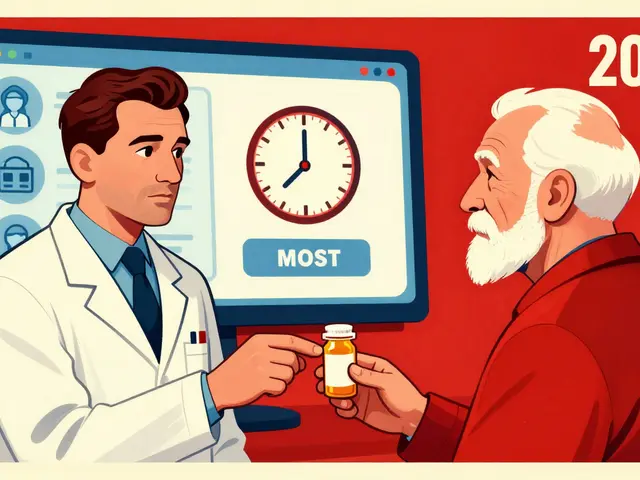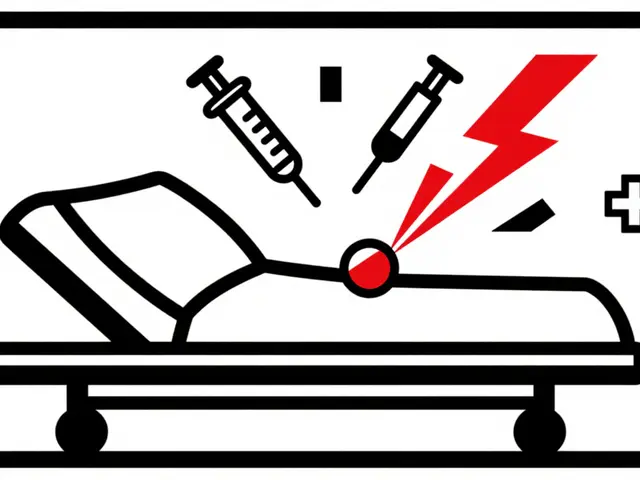Understanding Albendazole Resistance
As a widely used anthelmintic drug, albendazole has been remarkably effective in treating parasitic infections. However, over the years, we have noticed an increasing prevalence of albendazole resistance. In this section, we will explore what albendazole resistance is, how it develops, and why it's a growing concern for global health.
Albendazole works by inhibiting the uptake of glucose in parasites, which eventually leads to their death. However, some parasites have developed mechanisms to resist the effects of the drug, making it less effective in treating infections. This resistance poses a significant threat to our ability to control and eliminate parasitic infections worldwide.
The Root Causes of Albendazole Resistance
Several factors contribute to the development of albendazole resistance. Understanding these factors is crucial in identifying potential solutions to combat this problem. In this section, we will discuss the key causes of albendazole resistance, including genetic mutations, drug pressure, and improper drug administration.
Genetic mutations in parasites can lead to changes in their molecular structure, making them less susceptible to the effects of albendazole. Additionally, the continuous use of the drug exerts pressure on the parasites, selecting for those that can survive the treatment. This process, known as drug pressure, can lead to an increased prevalence of resistant parasites. Lastly, improper administration of the drug, such as incorrect dosages or incomplete courses of treatment, can also contribute to the development of resistance.
Monitoring and Detecting Resistance
Early detection of albendazole resistance is essential in preventing its spread and mitigating its impact on global health. In this section, we will discuss the importance of monitoring and surveillance programs, as well as the diagnostic tools used to identify resistant parasites.
Regular monitoring and surveillance of drug efficacy can help identify areas where resistance is emerging, allowing for timely interventions to prevent further spread. Diagnostic tools, such as molecular techniques and in vivo assays, can be used to detect genetic markers associated with resistance and assess the drug's effectiveness in treating infections.
Alternative Treatment Options
As albendazole resistance continues to grow, it's essential to explore alternative treatment options to ensure effective control of parasitic infections. In this section, we will discuss potential alternatives to albendazole, including new drugs, drug combinations, and non-pharmacological approaches.
Researchers are continually working on developing new anthelmintic drugs that can effectively treat resistant parasites. Additionally, combining albendazole with other anthelmintic drugs may help enhance its efficacy and reduce the likelihood of resistance development. Non-pharmacological approaches, such as improving sanitation, hygiene, and access to clean water, can also play a crucial role in controlling parasitic infections.
Educating Communities about Albendazole Resistance
Public awareness and understanding of albendazole resistance are critical in promoting responsible drug use and preventing the spread of resistant parasites. In this section, we will discuss the importance of educating communities about the issue and the various strategies that can be employed to increase awareness.
Education campaigns targeting both healthcare providers and the general public can help raise awareness about the dangers of albendazole resistance and promote responsible drug use. These campaigns can include informational materials, workshops, and community-based interventions that emphasize the importance of proper drug administration and adherence to treatment guidelines.
Collaboration and Coordination among Stakeholders
Addressing the challenge of albendazole resistance requires a coordinated effort from various stakeholders, including governments, healthcare providers, researchers, and communities. In this section, we will discuss the importance of collaboration and coordination among these stakeholders in combating albendazole resistance.
Effective communication and collaboration among stakeholders can help ensure that resources are efficiently allocated, research findings are shared, and best practices are adopted to address the issue of albendazole resistance. By working together, stakeholders can develop and implement comprehensive strategies that target the root causes of resistance and promote sustainable solutions.
Conclusion
Albendazole resistance is a growing concern that threatens our ability to control and eliminate parasitic infections worldwide. By understanding the causes of resistance, developing alternative treatment options, and promoting responsible drug use through education and collaboration, we can work together to address this challenge and protect global health.






Varun Gupta
May 12, 2023 AT 08:35lol so albendazole is now a dengue cure? 🤡 next they'll say it cures climate change too. someone's been drinking the pharma kool-aid. 🍹
Amy Reynal
May 12, 2023 AT 14:11i mean... the article is technically accurate but also kinda misses the point? like yes genetic mutations + drug pressure = resistance, but have we ever stopped to ask why we're giving this drug to *everybody* in endemic zones like it's vitamin c? 🤔 we're not treating infections, we're running a mass deworming festival with zero follow-up. and the sanitation part? yeah that's the real fix but nobody wants to fund latrines when they can just pump out pills. 🏭💧
Erick Horn
May 14, 2023 AT 06:51Resistance? Shocking. Next you'll tell me antibiotics don't work.
Lidia Hertel
May 14, 2023 AT 11:15Honestly? This is such an important topic and i'm so glad someone's talking about it 🥹 i remember volunteering in rural india and seeing kids get albendazole every 6 months like clockwork - but no clean water, no shoes, no education on hygiene. it's like giving bandaids to someone with a broken leg and wondering why they still limp. 🌍💙 we need to think systemic, not just pharmaceutical. also, combo therapies are *so* promising - mebendazole + albendazole has shown way better results in trials. just needs more funding and less bureaucracy. 💪
Chris Bock
May 15, 2023 AT 20:59We are all parasites. 🤔
Alyson Knisel
May 16, 2023 AT 10:50i think the real issue is we treat parasites like enemies instead of just... organisms trying to survive. kinda like how we treat people who are different. maybe we need less war and more coexistence? 🤷♀️
Jelisa Cameron- Humphrey
May 16, 2023 AT 13:09The pharmacokinetic profiling of albendazole sulfoxide metabolites in helminth-infected populations demonstrates significant inter-individual variability in Cmax and AUC, which correlates with subtherapeutic exposure and subsequent selection pressure for resistant genotypes. Additionally, the absence of pharmacovigilance infrastructure in LMICs exacerbates surveillance gaps. We must implement real-time molecular diagnostics coupled with geospatial mapping of drug distribution to model resistance emergence trajectories.
Lee Lach
May 17, 2023 AT 00:37This is a manufactured crisis orchestrated by the WHO to justify their billion-dollar deworming empire. The data on albendazole resistance is cherry-picked. In reality, the parasite burden has decreased 80% since 2000 - but the narrative must be maintained to keep the funding flowing. You're being manipulated. Wake up.
Tracy McKee
May 17, 2023 AT 20:48People just dont take the meds right like duh its not the drugs its the users and also why are we even giving this to everyone its not like they have worms all the time
Abigail M. Bautista
May 18, 2023 AT 10:41i read the article
Rohan Puri
May 19, 2023 AT 08:56why are we even talking about this its not like we can fix it so just stop wasting time
Mandeep Singh
May 20, 2023 AT 19:11India has the best deworming program in the world. Stop trying to undermine our success with western nonsense.
Chris Bellante
May 21, 2023 AT 03:52In the Niger Delta, we use albendazole but also traditional leaf poultices - the community trusts the herbs more. The drug helps, sure, but the real power? Local knowledge. You can't patent a grandmother's wisdom. 🌿
Frederick Staal
May 22, 2023 AT 01:58I've spent 14 years studying this. You think this is about parasites? No. It's about control. The pharmaceutical-industrial complex needs perpetual demand. Albendazole resistance isn't a biological phenomenon - it's a financial one. The data you're seeing? Curated. The solutions? Designed to keep you dependent.
erin orina
May 22, 2023 AT 11:07This is actually really hopeful to me 🥺 like... we *can* fix this if we work together. The combo therapies, the sanitation projects, the community education - it's all doable. We just need to care enough to fund it. I believe in us. 💕
Amy Reynal
May 23, 2023 AT 05:11I'm gonna be real - I think the author of this post is actually trying to say something profound without saying it: we treat parasites like villains because we're terrified of our own vulnerability. We want a magic pill, not a messy, expensive, long-term social fix. But here's the truth: the most effective 'drug' is dignity. Clean water. Shoes. Education. Food. Those are the real anthelmintics. 🌱